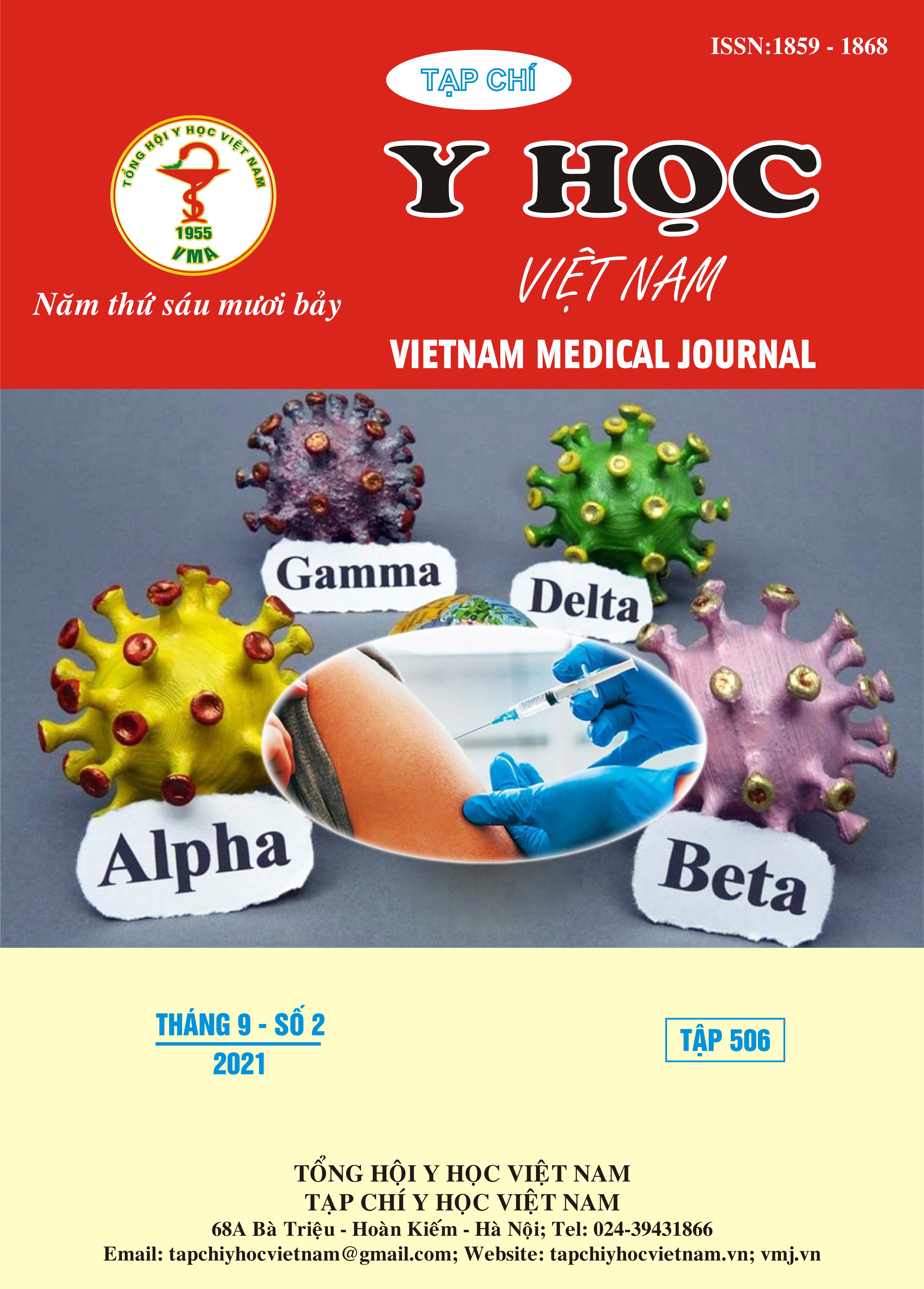EVALUATING THE RESULTS OF TREATMENT EPIDERMAL GROWTH FACTOR RECEPTOR MUTANT NON-SMALL CELL LUNG CANCER METASTASIS BRAIN WITH TYROSINE KINASE INHIBITORS COMBINED WITH ROTATING GAMMA SYSTEM AT BACH MAI HOSPITAL
Main Article Content
Abstract
Object: Evaluating the efficacy and toxicity of treatment epidermal growth factor receptor mutant non small cell lung cancer metastasis brain with tyrosine kinase inhibitors combined with Rotating gamma System at the Nuclear Medicine and Oncology Center, Bach Mai Hospital. Patient and Methods: A retrospective combined prospective study on 53 patients diagnosed with epidermal growth factor receptor mutant non small cell lung cancer metastasis brain, treated with tyrosine kinase inhibitors combined with Rotating gamma System at the Nuclear Medicine and Oncology Center, Bach Mai Hospital. Results: 50.9% men, the male/female ratio is equal (1.04/1), mainly in the age group 50-69 (73.6%). PS ECOG from 0 to 2, mainly 0-1 (81.1%). Brain metastasis often combine with metastasis to other organs (64.2%), most of which was bone metastasis (49.1%), followed by metastases in lung, pleura (28.3%). The TKIs contained: Erlotinib (47.2%), Gefitinib (43.4%), Afatinib (9.4%). The rate of patients improved functional symptoms in 88.7%. The objective response rate was 69.0%, mainly partial response (66.7%), there was no statistically significant difference between the TKIs with p > 0.05. Survival time was calculated according to the Kaplan-Meyer method. The median progression-free survival (PFS) time was 14.0 months (95% CI: 11.6-16.4 months). Objective response was a predictor of PFS longer with p<0.01. The median intracranial PFS time was 22.0 months (95% CI: 18.2-25.8 months). Systemic treatment with Erlotinib resulted in a longer duration of intracranial PFS time than Gefitinib and Afatinib in multivariate analysis with p < 0.05. The median overall survival (OS) time was 25.0 months (95% CI: 11.0-39.0 months), the 1-year survival rate was 85.7%, and the 2-year survival rate was 52.0%. Multivariate analysis, second-line systemic treatment with tyrosine kinase drugs (Afatinib, osimertinib) for median overall survival time was longer than chemotherapy and no treatment was 39 months, 20 months, 14 months, respectively, the difference was statistically significant with p< 0.05. Common side effects of the regimen were skin rash (52.8%), diarrhea (16.9%), increased liver enzymes (11.3%), all mild. to medium. There were no complications of ventricular dilatation, necrosis of brain tissue after radiosurgery. Diarrhea was more common in the Afatinib group than Erlotinib and Gefitinib, the difference was statistically significant with p < 0.05. The majority of patients adhered to the regimen, moderate toxicity caused 2 patients to stop for a short time, 2 patients to reduce the dose. Conclusion: Treatment of patients with brain metastatic lung cancer with EGFR mutations with tyrosine kinase inhibitors combined with rotary gamma knife radiosurgery is an effective and safe method.
Article Details
Keywords
tyrosine kinase inhibitors, rotating gamma knife, brain metastatic lung cancer, EGFR mutation
References
2. Davis F G, Dolecek T A, McCarthy B J, et al (2012). "Toward determining the lifetime occurrence of metastatic brain tumors estimated from 2007 United States cancer incidence data". Neuro Oncol, 14 (9), 1171-1177.
3. Mai Trọng Khoa (2020). Hướng dẫn chẩn đoán và điều trị một số bệnh lý ung bướu, Nhà xuất bản Y học,
4. Mok T S, Wu Y L, Thongprasert S, et al (2009). "Gefitinib or carboplatin-paclitaxel in pulmonary adenocarcinoma". N Engl J Med, 361 (10), 947-957.
5. Lê Thu Hà (2017). Đánh giá hiệu quả thuốc Erlotinib trong điều trị ung thư phổi biểu mô tuyến giai đoạn muộn, Luận án Tiến sỹ y học, Trường Đại học y Hà Nội.
6. Phạm Văn Thái (2014). Nghiên cứu điều trị ung thư phổi không tế bào nhỏ di căn não bằng hoá xạ trị, Luận án Tiến sỹ y học, Trường Đại học y Hà Nội.
7. Park K, Tan E H, O'Byrne K, et al (2016). "Afatinib versus gefitinib as first-line treatment of patients with EGFR mutation-positive non-small-cell lung cancer (LUX-Lung 7): a phase 2B, open-label, randomised controlled trial". Lancet Oncol, 17 (5), 577-589.
8. Nan X, Xie C, Yu X, et al (2017). "EGFR TKI as first-line treatment for patients with advanced EGFR mutation-positive non-small-cell lung cancer". Oncotarget, 8 (43), 75712-75726.
9. Yang S H, Kim H Y (2020). "The Effect of Epidermal Growth Factor Receptor Mutation on Intracranial Progression-Free Survival of Non-Small Cell Lung Cancer Patients with Brain Metastasis Underwent Gamma Knife Radiosurgery". 8 (2), 103-108.


